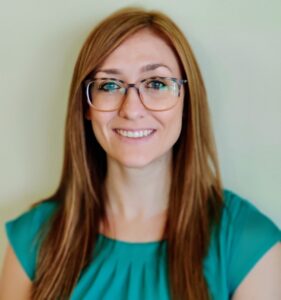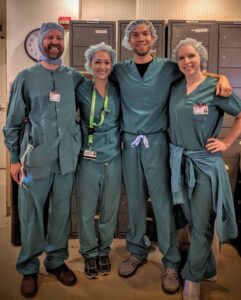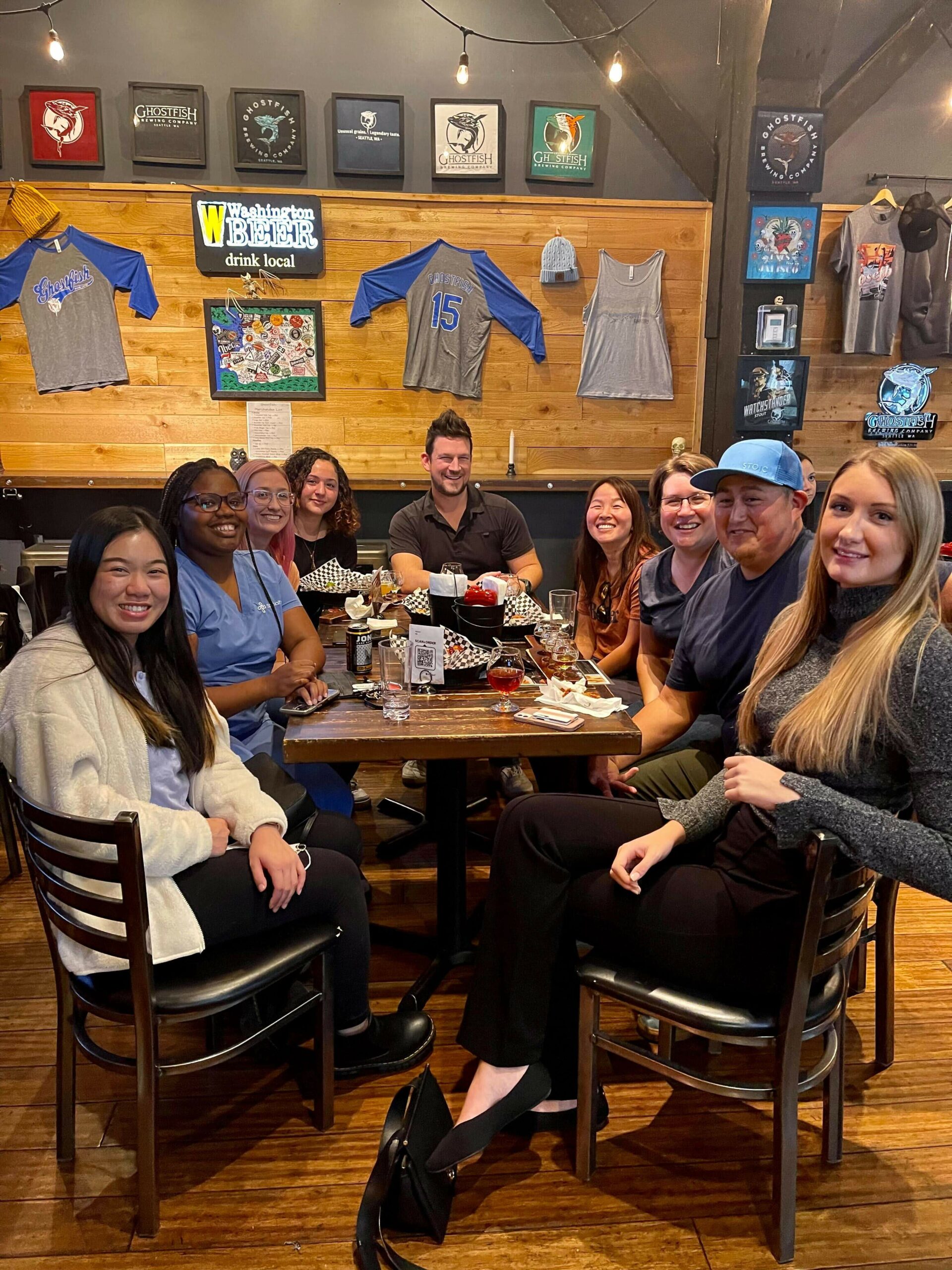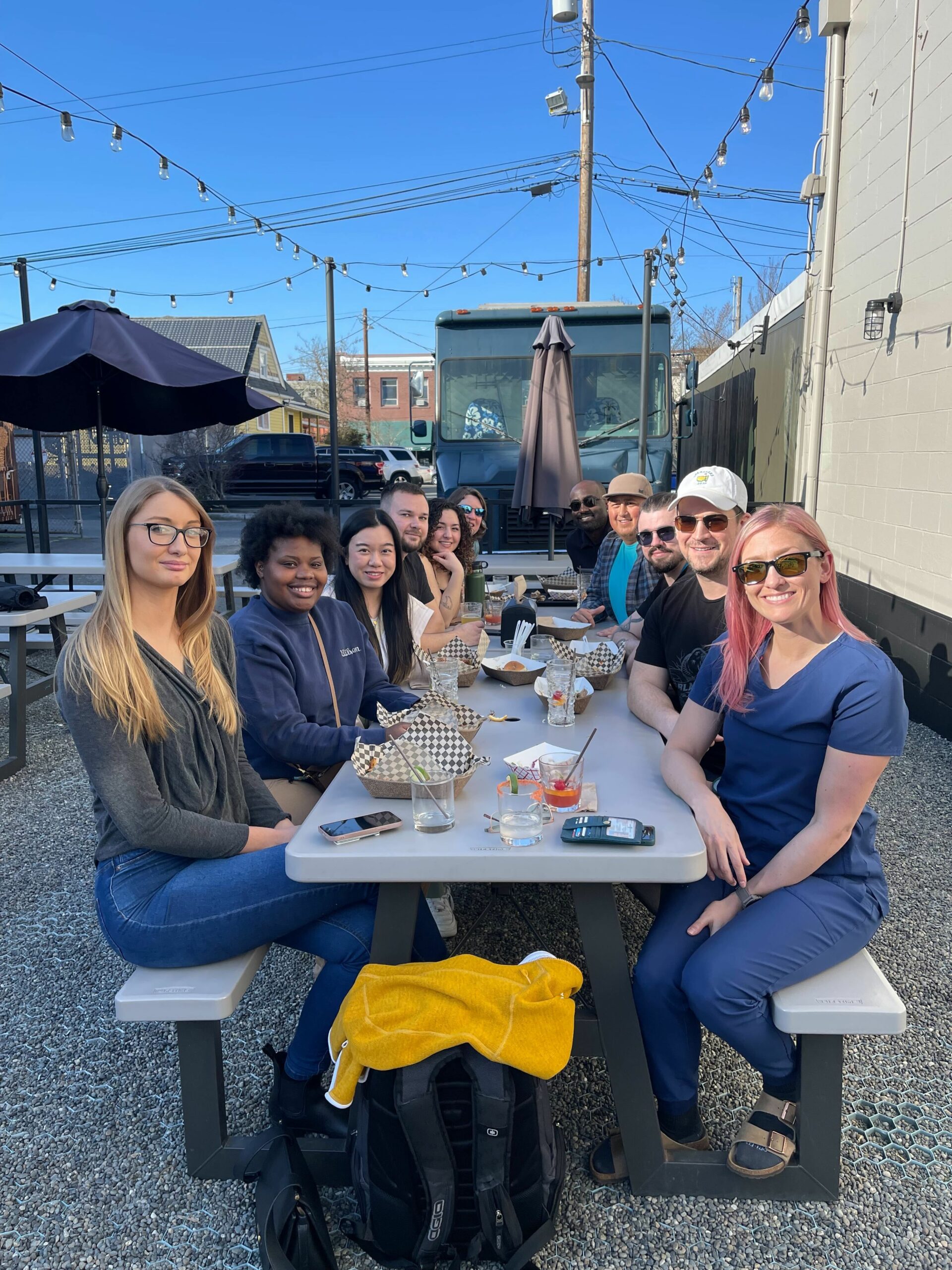In the medical field, there are countless skills you can’t learn from textbooks or labs. They get passed down from mentors — through demonstrations, guidance, advice, and observing how they handle a variety of scenarios in real time. Mentorship provides you with the confidence, encouragement, and direction that can make your career more exciting and fulfilling.
Kaytie Bateman is a surgical neurophysiologist with SpecialtyCare who works with new students in the SNI training program. We interviewed her — and a couple of her students — to discover more about the incredible value of mentorship in medicine.
 “It is always a privilege to mentor new students in our SNI training program,” says Kaytie. “I went through the program back in 2014, fresh out of college and thrust into the working world — and I remember how exciting, overwhelming, and humbling the experience was. [Mentorship is] about guiding the trainees through the training process in a way that is fun yet challenging.”
“It is always a privilege to mentor new students in our SNI training program,” says Kaytie. “I went through the program back in 2014, fresh out of college and thrust into the working world — and I remember how exciting, overwhelming, and humbling the experience was. [Mentorship is] about guiding the trainees through the training process in a way that is fun yet challenging.”
“I’m not only there as an instructor to help establish the guidelines set by our educational program, but I’m there to cheer [the students] on throughout the process. If I have a trainee who is eager to learn and honest in their work, I will always strive to be supportive and encouraging, through the process and beyond.”
Good Mentorship Brings Out the Best in You
Having a great mentor can help you set your expectations, gain a positive outlook, and have a learning mindset throughout changing or adverse circumstances.
“I have been with SpecialtyCare for nearly 9 years now, and I can say it is because of the high clinical standards that have been set by this company and the fantastic mentors and instructors I’ve had within the SNI training program,” says Kaytie.
“Jeremy McCallister, Eugene Martin, Kwai Alier Kwai, Amanda Duncan, Alier Franco, Vijay Tambi, Josh Singer… and so many more! Having such wonderful mentors has shaped my outlook on how to be the best that I can in the operating room.”
“They have taught me to remember that these are real people on the table: mothers, fathers, grandmas and grandpas — doing your best clinically and setting high standards is taking care of loved ones. Having a great mentor to work with defines your perspective and provides all of the support needed to thrive in this job. We are continually evolving, learning, and never complacent.”
A good mentor also brings out the best in both the mentor and the mentee.
“A mentor helps elevate performance by constantly challenging the trainee’s perspective, setting high standards, and supporting the trainee through struggle and triumph,” says Kaytie. “The surgeons I work with know that one of my favorite parts of the training process is when I get to play ‘chaos’ and challenge ways of thinking. They’ll see me sneaking around unplugging things and trying to keep a straight face as the SNIs are sweating bullets trying to figure out if it’s technical or real. I’ve had surgeons or anesthesiologists sit back in the corner and listen to my lectures and add insightful comments.
“We elevate performance by providing more than enough information to support the trainee, by helping them create relationships in the operating room, by giving them the knowledge and confidence to support the team, and by always being available to help. All of my trainees in Philadelphia, in Houston, and now Seattle – I hope they know I am always here for help when it’s needed.”
Mentorship Is Rewarding for Both Trainers and Trainees

Additionally, mentorship can be a deeply rewarding experience.
“I think seeing epiphanies is the most rewarding,” says Kaytie. “We see mechanical, robotic thoughts at the beginning that transition into a fluid movement filled with purpose. It varies with all trainees, maybe a couple weeks through the program or a couple months. I always tell my trainees it’s not a race, and I eagerly await the moment, but that turning point is the most rewarding to me. I am like a cheerleader on the sidelines in these moments, I’m so proud of their hard work and determination that got them to this point.
“The most recent example that I can think of in terms of a clinical training win was our recent acquisition of Seattle Children’s Hospital. I knew it was going to be challenging, and most were cases that our trainees had never seen before.
“I had just trained Margo Parker at Marybridge Children’s on AIS and neuromuscular scoliosis procedures and was so proud of the way she stepped up when the challenge was brought to her. She started out as a trainee but has quickly become a colleague that I admire and respect as a partner. She’s been beside me handling some of the most difficult cases and thriving in the challenge.
“Mentorship wins, to me, are the respect and gratitude that a trainee demonstrates in or after the program. It’s when they challenge me to be better and respect that I may not have all the answers, but we’ll work to find them together.
“To a few clinicians that are with SpecialtyCare today: Andrey Kosolapov, Elisabeth Pollis, Charlie Springer, Alex Gu, Margo Parker, Sandy Le, Brandon Coby, Mae Lewko, Essence Hall… thank you all for your hard work and friendship over the years.”
Mentorship Improves Patient Care
Clearly, mentorship is a gift that keeps giving long after it’s over — and a couple of Kaytie’s mentees have spoken up about how her contributions and encouragement have benefitted them so far.
“Having a mentor like Kaytie will set you up for success in the IONM field,” says May Lewko, Surgical Neurophysiologist. “I would consider Kaytie to be an amazing instructor because she truly cares about the patient and our understanding of the pathophysiology of the patient. She also emphasizes a whole picture approach … understanding how the signals we see on our screen connect to the patient on the table and surgical steps that are occurring.
“She puts in the time with us, showing up as early as needed to set us trainees up for success. She answers every question with detail and is available 24/7 to help with any questions or concerns we may have.
“While I haven’t had the opportunity to work with Kaytie much, she never ceases to amaze me. She really is an incredible clinician and someone to strive to be like. Her communication and relationships with the surgeons are truly incredible and every time I work with her, I learn something new! Kaytie is a glowing example of how to be in the OR and creates a great learning environment for her trainees. We all want to eventually become little Kayties.”
 Mentors Help You Expand Your Skill Set
Mentors Help You Expand Your Skill Set
Sandy Le, Surgical Neurophysiologist, also praises Kaytie’s example and the amount she has learned from her.
“A great instructor is able to guide you through both clinical and classroom lessons,” says Sandy. “Kaytie is patient and has been able to show me how to navigate different atmospheres in the OR. When I was still in training, she would give me realistic troubleshooting problems to solve, and now that I am solo, I am fully prepared for anything! I can always trust her to be by my side (or phone!) whenever I have a tough case or pathology.
“Kaytie has taught me so many new skills that I can bring into different ORs. She is incredibly knowledgeable and emphasizes the importance of understanding our data in order to be a great clinician. I can honestly say I get my efficiency and communication skills from her. Without her instruction, I wouldn’t be able to build such great rapport without surgeons and staff. Trust me when I say that we SN’s love having Kaytie on our Seattle team.”
Grow in Mentorship When You Join Our Team
Whether you’re ready to become a mentor or you’re seeking mentorship, you’ll find a fit when you join the SpecialtyCare team. We’re privileged to have awesome people who are growing, both personally and professionally, and fostering the skills of others at hospitals around the country. More mentorship means more community, better patient care, and better outcomes. “This is about building connections and learning from one another,” says Kaytie. “Being a mentor is also about creating foundations: learning to trust each other, challenge each other, and support one another.”




